Social Psychology: Pop Culture, WWII Impact, and Concepts
VerifiedAdded on 2022/10/10
|6
|1343
|13
Essay
AI Summary
This essay delves into the field of social psychology, defining its scope as the scientific study of how individuals' thoughts, feelings, and behaviors are influenced by others, both real and imagined. It examines the interplay between social environments and individual responses, highlighting the distinction between social psychology and related disciplines. The essay explores pop culture's impact, particularly the tension between individualism and conformity, and how cultural norms shape behavior. Furthermore, it analyzes the significant impact of World War II on the structure and direction of social psychology, emphasizing the use of psychological insights in warfare and the subsequent evolution of the field. The essay references several key academic sources to support its arguments.
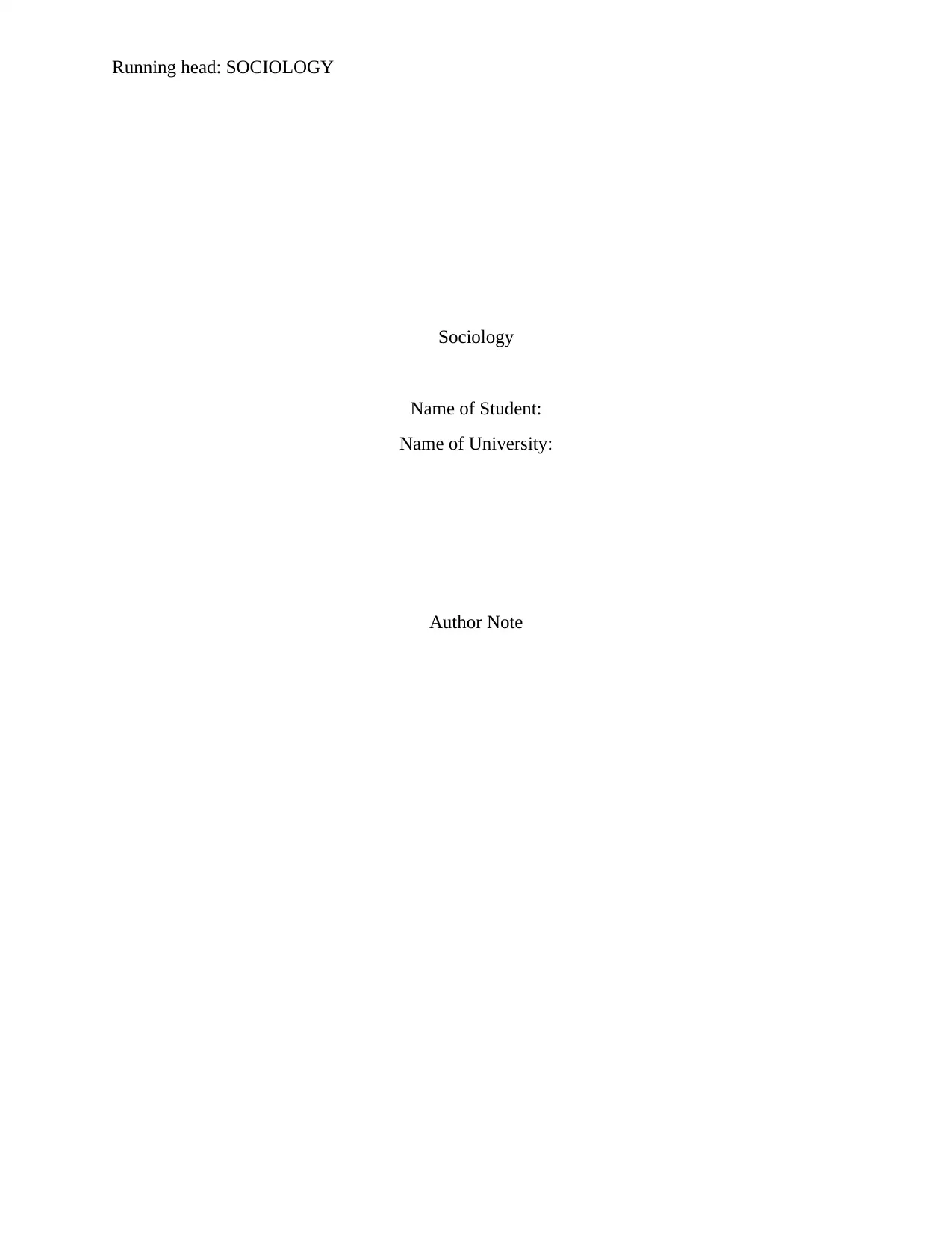
Running head: SOCIOLOGY
Sociology
Name of Student:
Name of University:
Author Note
Sociology
Name of Student:
Name of University:
Author Note
Paraphrase This Document
Need a fresh take? Get an instant paraphrase of this document with our AI Paraphraser
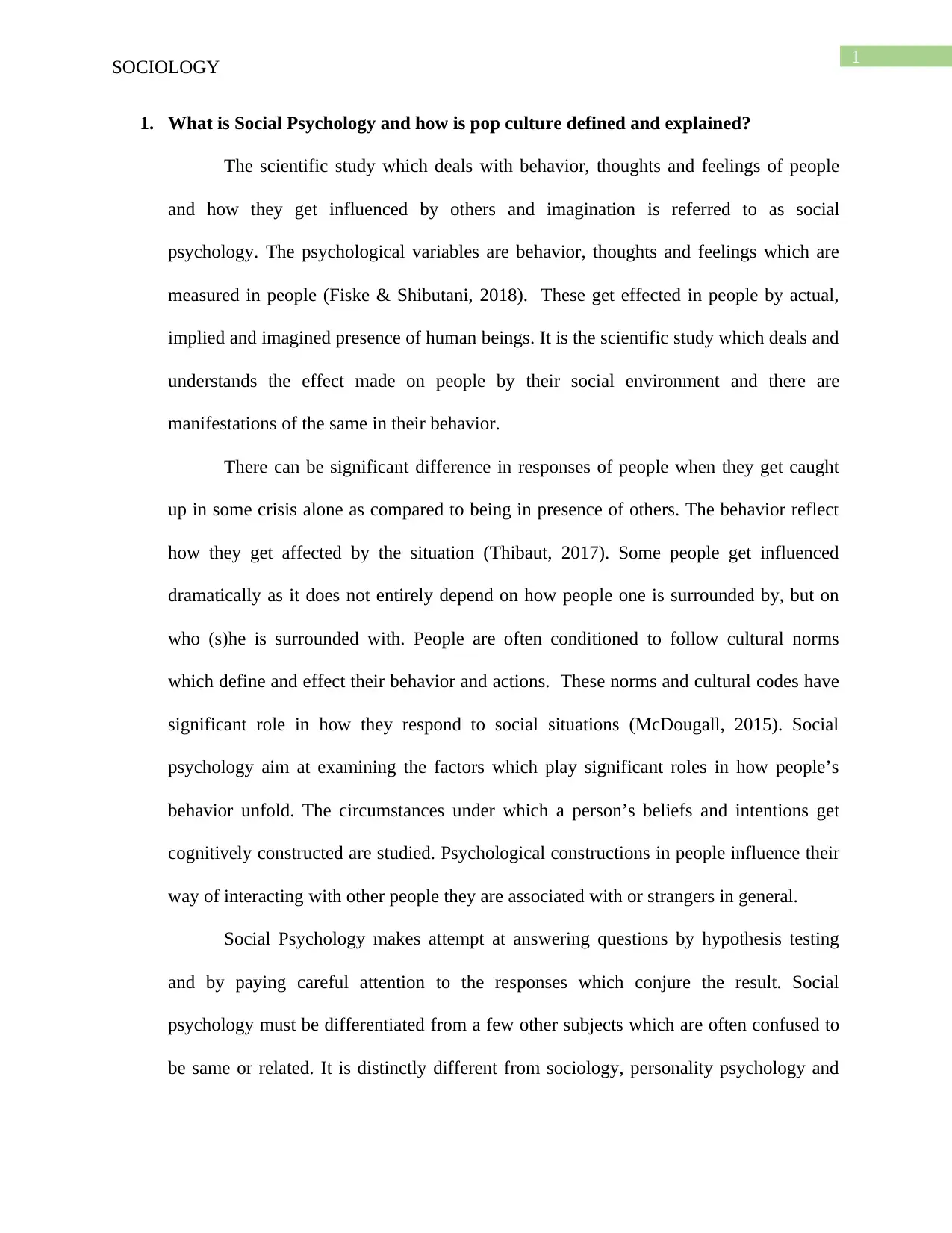
1
SOCIOLOGY
1. What is Social Psychology and how is pop culture defined and explained?
The scientific study which deals with behavior, thoughts and feelings of people
and how they get influenced by others and imagination is referred to as social
psychology. The psychological variables are behavior, thoughts and feelings which are
measured in people (Fiske & Shibutani, 2018). These get effected in people by actual,
implied and imagined presence of human beings. It is the scientific study which deals and
understands the effect made on people by their social environment and there are
manifestations of the same in their behavior.
There can be significant difference in responses of people when they get caught
up in some crisis alone as compared to being in presence of others. The behavior reflect
how they get affected by the situation (Thibaut, 2017). Some people get influenced
dramatically as it does not entirely depend on how people one is surrounded by, but on
who (s)he is surrounded with. People are often conditioned to follow cultural norms
which define and effect their behavior and actions. These norms and cultural codes have
significant role in how they respond to social situations (McDougall, 2015). Social
psychology aim at examining the factors which play significant roles in how people’s
behavior unfold. The circumstances under which a person’s beliefs and intentions get
cognitively constructed are studied. Psychological constructions in people influence their
way of interacting with other people they are associated with or strangers in general.
Social Psychology makes attempt at answering questions by hypothesis testing
and by paying careful attention to the responses which conjure the result. Social
psychology must be differentiated from a few other subjects which are often confused to
be same or related. It is distinctly different from sociology, personality psychology and
SOCIOLOGY
1. What is Social Psychology and how is pop culture defined and explained?
The scientific study which deals with behavior, thoughts and feelings of people
and how they get influenced by others and imagination is referred to as social
psychology. The psychological variables are behavior, thoughts and feelings which are
measured in people (Fiske & Shibutani, 2018). These get effected in people by actual,
implied and imagined presence of human beings. It is the scientific study which deals and
understands the effect made on people by their social environment and there are
manifestations of the same in their behavior.
There can be significant difference in responses of people when they get caught
up in some crisis alone as compared to being in presence of others. The behavior reflect
how they get affected by the situation (Thibaut, 2017). Some people get influenced
dramatically as it does not entirely depend on how people one is surrounded by, but on
who (s)he is surrounded with. People are often conditioned to follow cultural norms
which define and effect their behavior and actions. These norms and cultural codes have
significant role in how they respond to social situations (McDougall, 2015). Social
psychology aim at examining the factors which play significant roles in how people’s
behavior unfold. The circumstances under which a person’s beliefs and intentions get
cognitively constructed are studied. Psychological constructions in people influence their
way of interacting with other people they are associated with or strangers in general.
Social Psychology makes attempt at answering questions by hypothesis testing
and by paying careful attention to the responses which conjure the result. Social
psychology must be differentiated from a few other subjects which are often confused to
be same or related. It is distinctly different from sociology, personality psychology and
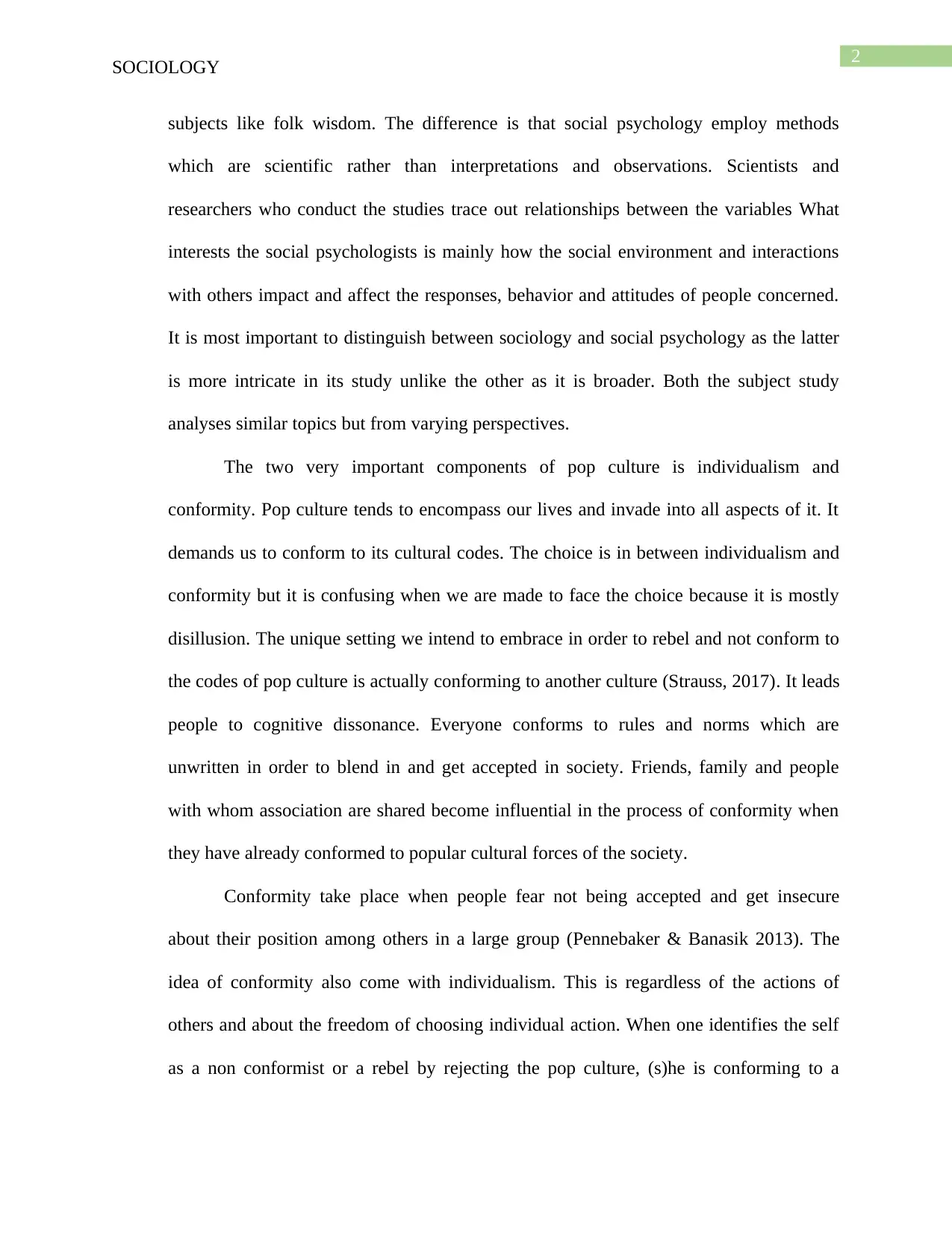
2
SOCIOLOGY
subjects like folk wisdom. The difference is that social psychology employ methods
which are scientific rather than interpretations and observations. Scientists and
researchers who conduct the studies trace out relationships between the variables What
interests the social psychologists is mainly how the social environment and interactions
with others impact and affect the responses, behavior and attitudes of people concerned.
It is most important to distinguish between sociology and social psychology as the latter
is more intricate in its study unlike the other as it is broader. Both the subject study
analyses similar topics but from varying perspectives.
The two very important components of pop culture is individualism and
conformity. Pop culture tends to encompass our lives and invade into all aspects of it. It
demands us to conform to its cultural codes. The choice is in between individualism and
conformity but it is confusing when we are made to face the choice because it is mostly
disillusion. The unique setting we intend to embrace in order to rebel and not conform to
the codes of pop culture is actually conforming to another culture (Strauss, 2017). It leads
people to cognitive dissonance. Everyone conforms to rules and norms which are
unwritten in order to blend in and get accepted in society. Friends, family and people
with whom association are shared become influential in the process of conformity when
they have already conformed to popular cultural forces of the society.
Conformity take place when people fear not being accepted and get insecure
about their position among others in a large group (Pennebaker & Banasik 2013). The
idea of conformity also come with individualism. This is regardless of the actions of
others and about the freedom of choosing individual action. When one identifies the self
as a non conformist or a rebel by rejecting the pop culture, (s)he is conforming to a
SOCIOLOGY
subjects like folk wisdom. The difference is that social psychology employ methods
which are scientific rather than interpretations and observations. Scientists and
researchers who conduct the studies trace out relationships between the variables What
interests the social psychologists is mainly how the social environment and interactions
with others impact and affect the responses, behavior and attitudes of people concerned.
It is most important to distinguish between sociology and social psychology as the latter
is more intricate in its study unlike the other as it is broader. Both the subject study
analyses similar topics but from varying perspectives.
The two very important components of pop culture is individualism and
conformity. Pop culture tends to encompass our lives and invade into all aspects of it. It
demands us to conform to its cultural codes. The choice is in between individualism and
conformity but it is confusing when we are made to face the choice because it is mostly
disillusion. The unique setting we intend to embrace in order to rebel and not conform to
the codes of pop culture is actually conforming to another culture (Strauss, 2017). It leads
people to cognitive dissonance. Everyone conforms to rules and norms which are
unwritten in order to blend in and get accepted in society. Friends, family and people
with whom association are shared become influential in the process of conformity when
they have already conformed to popular cultural forces of the society.
Conformity take place when people fear not being accepted and get insecure
about their position among others in a large group (Pennebaker & Banasik 2013). The
idea of conformity also come with individualism. This is regardless of the actions of
others and about the freedom of choosing individual action. When one identifies the self
as a non conformist or a rebel by rejecting the pop culture, (s)he is conforming to a
⊘ This is a preview!⊘
Do you want full access?
Subscribe today to unlock all pages.

Trusted by 1+ million students worldwide
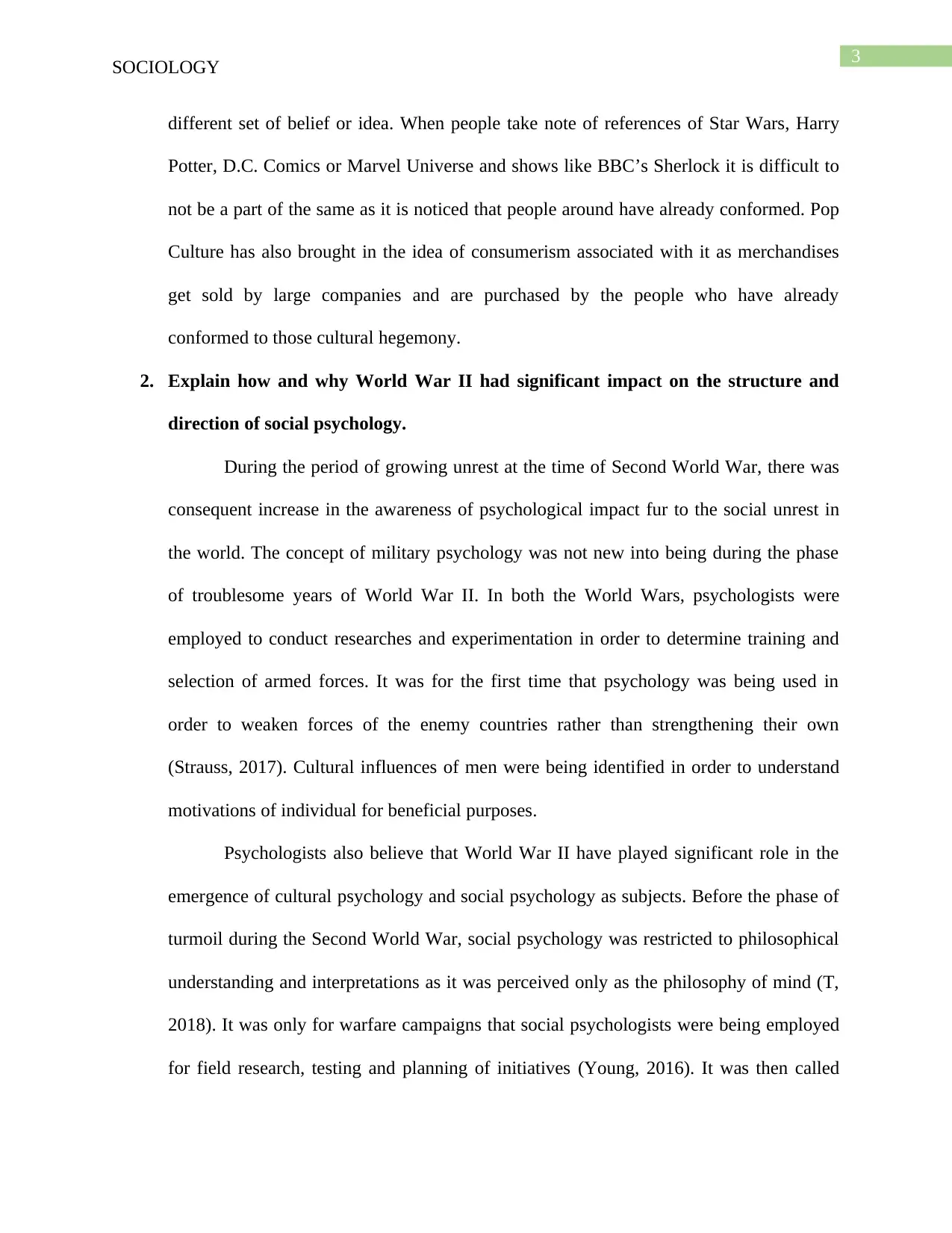
3
SOCIOLOGY
different set of belief or idea. When people take note of references of Star Wars, Harry
Potter, D.C. Comics or Marvel Universe and shows like BBC’s Sherlock it is difficult to
not be a part of the same as it is noticed that people around have already conformed. Pop
Culture has also brought in the idea of consumerism associated with it as merchandises
get sold by large companies and are purchased by the people who have already
conformed to those cultural hegemony.
2. Explain how and why World War II had significant impact on the structure and
direction of social psychology.
During the period of growing unrest at the time of Second World War, there was
consequent increase in the awareness of psychological impact fur to the social unrest in
the world. The concept of military psychology was not new into being during the phase
of troublesome years of World War II. In both the World Wars, psychologists were
employed to conduct researches and experimentation in order to determine training and
selection of armed forces. It was for the first time that psychology was being used in
order to weaken forces of the enemy countries rather than strengthening their own
(Strauss, 2017). Cultural influences of men were being identified in order to understand
motivations of individual for beneficial purposes.
Psychologists also believe that World War II have played significant role in the
emergence of cultural psychology and social psychology as subjects. Before the phase of
turmoil during the Second World War, social psychology was restricted to philosophical
understanding and interpretations as it was perceived only as the philosophy of mind (T,
2018). It was only for warfare campaigns that social psychologists were being employed
for field research, testing and planning of initiatives (Young, 2016). It was then called
SOCIOLOGY
different set of belief or idea. When people take note of references of Star Wars, Harry
Potter, D.C. Comics or Marvel Universe and shows like BBC’s Sherlock it is difficult to
not be a part of the same as it is noticed that people around have already conformed. Pop
Culture has also brought in the idea of consumerism associated with it as merchandises
get sold by large companies and are purchased by the people who have already
conformed to those cultural hegemony.
2. Explain how and why World War II had significant impact on the structure and
direction of social psychology.
During the period of growing unrest at the time of Second World War, there was
consequent increase in the awareness of psychological impact fur to the social unrest in
the world. The concept of military psychology was not new into being during the phase
of troublesome years of World War II. In both the World Wars, psychologists were
employed to conduct researches and experimentation in order to determine training and
selection of armed forces. It was for the first time that psychology was being used in
order to weaken forces of the enemy countries rather than strengthening their own
(Strauss, 2017). Cultural influences of men were being identified in order to understand
motivations of individual for beneficial purposes.
Psychologists also believe that World War II have played significant role in the
emergence of cultural psychology and social psychology as subjects. Before the phase of
turmoil during the Second World War, social psychology was restricted to philosophical
understanding and interpretations as it was perceived only as the philosophy of mind (T,
2018). It was only for warfare campaigns that social psychologists were being employed
for field research, testing and planning of initiatives (Young, 2016). It was then called
Paraphrase This Document
Need a fresh take? Get an instant paraphrase of this document with our AI Paraphraser
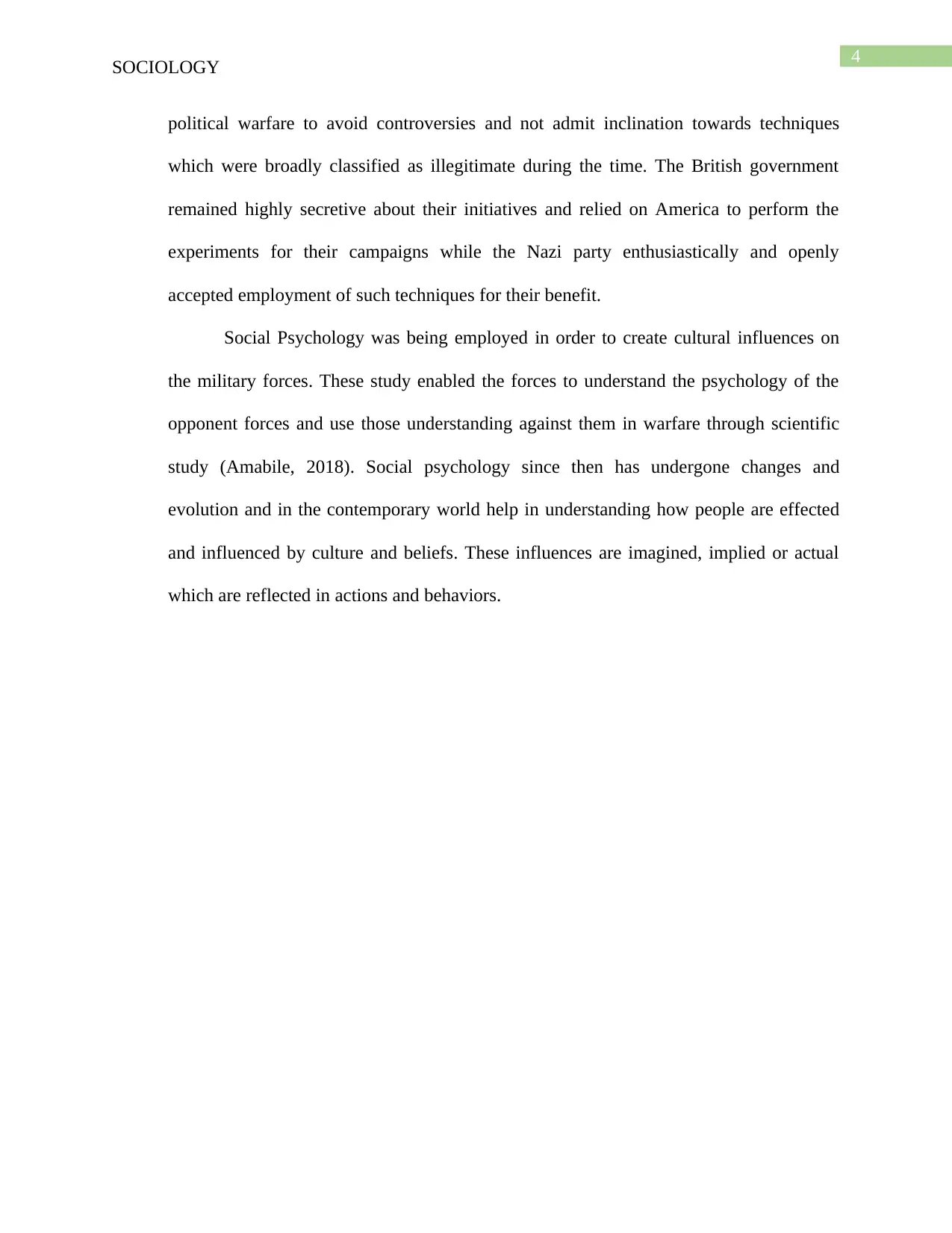
4
SOCIOLOGY
political warfare to avoid controversies and not admit inclination towards techniques
which were broadly classified as illegitimate during the time. The British government
remained highly secretive about their initiatives and relied on America to perform the
experiments for their campaigns while the Nazi party enthusiastically and openly
accepted employment of such techniques for their benefit.
Social Psychology was being employed in order to create cultural influences on
the military forces. These study enabled the forces to understand the psychology of the
opponent forces and use those understanding against them in warfare through scientific
study (Amabile, 2018). Social psychology since then has undergone changes and
evolution and in the contemporary world help in understanding how people are effected
and influenced by culture and beliefs. These influences are imagined, implied or actual
which are reflected in actions and behaviors.
SOCIOLOGY
political warfare to avoid controversies and not admit inclination towards techniques
which were broadly classified as illegitimate during the time. The British government
remained highly secretive about their initiatives and relied on America to perform the
experiments for their campaigns while the Nazi party enthusiastically and openly
accepted employment of such techniques for their benefit.
Social Psychology was being employed in order to create cultural influences on
the military forces. These study enabled the forces to understand the psychology of the
opponent forces and use those understanding against them in warfare through scientific
study (Amabile, 2018). Social psychology since then has undergone changes and
evolution and in the contemporary world help in understanding how people are effected
and influenced by culture and beliefs. These influences are imagined, implied or actual
which are reflected in actions and behaviors.
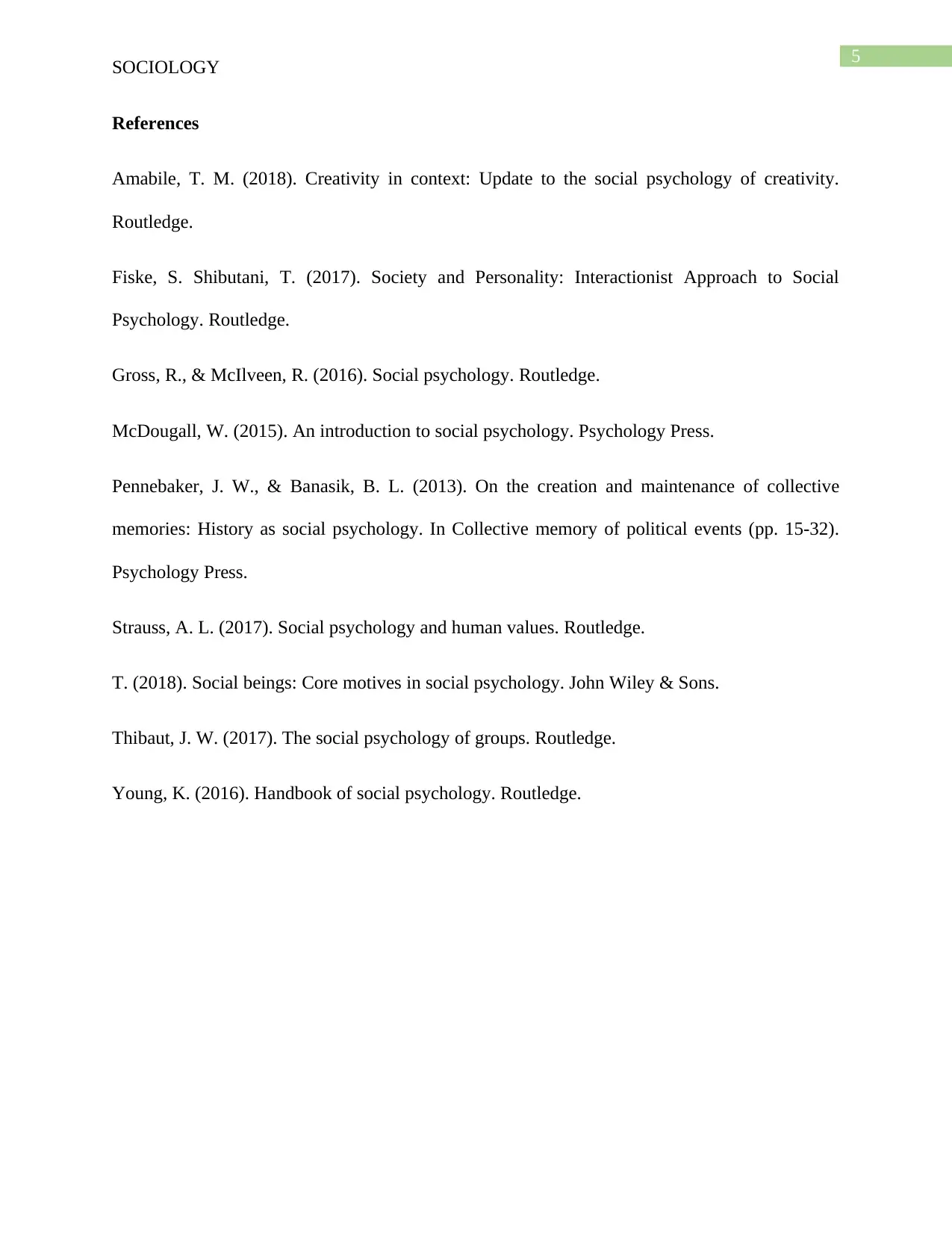
5
SOCIOLOGY
References
Amabile, T. M. (2018). Creativity in context: Update to the social psychology of creativity.
Routledge.
Fiske, S. Shibutani, T. (2017). Society and Personality: Interactionist Approach to Social
Psychology. Routledge.
Gross, R., & McIlveen, R. (2016). Social psychology. Routledge.
McDougall, W. (2015). An introduction to social psychology. Psychology Press.
Pennebaker, J. W., & Banasik, B. L. (2013). On the creation and maintenance of collective
memories: History as social psychology. In Collective memory of political events (pp. 15-32).
Psychology Press.
Strauss, A. L. (2017). Social psychology and human values. Routledge.
T. (2018). Social beings: Core motives in social psychology. John Wiley & Sons.
Thibaut, J. W. (2017). The social psychology of groups. Routledge.
Young, K. (2016). Handbook of social psychology. Routledge.
SOCIOLOGY
References
Amabile, T. M. (2018). Creativity in context: Update to the social psychology of creativity.
Routledge.
Fiske, S. Shibutani, T. (2017). Society and Personality: Interactionist Approach to Social
Psychology. Routledge.
Gross, R., & McIlveen, R. (2016). Social psychology. Routledge.
McDougall, W. (2015). An introduction to social psychology. Psychology Press.
Pennebaker, J. W., & Banasik, B. L. (2013). On the creation and maintenance of collective
memories: History as social psychology. In Collective memory of political events (pp. 15-32).
Psychology Press.
Strauss, A. L. (2017). Social psychology and human values. Routledge.
T. (2018). Social beings: Core motives in social psychology. John Wiley & Sons.
Thibaut, J. W. (2017). The social psychology of groups. Routledge.
Young, K. (2016). Handbook of social psychology. Routledge.
⊘ This is a preview!⊘
Do you want full access?
Subscribe today to unlock all pages.

Trusted by 1+ million students worldwide
1 out of 6
Related Documents
Your All-in-One AI-Powered Toolkit for Academic Success.
+13062052269
info@desklib.com
Available 24*7 on WhatsApp / Email
![[object Object]](/_next/static/media/star-bottom.7253800d.svg)
Unlock your academic potential
Copyright © 2020–2026 A2Z Services. All Rights Reserved. Developed and managed by ZUCOL.





